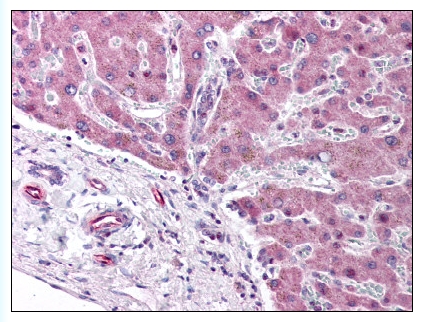Ppara (1-18) Rabbit Polyclonal Antibody
CAT#: AP07674PU-N
Ppara (1-18) rabbit polyclonal antibody, Aff - Purified
Need it in bulk or conjugated?
Get a free quote
CNY 6,116.00
货期*
5周
规格
| Cited in 1 publication. |
Specifications
| Product Data | |
| Applications | ELISA, IHC, WB |
| Recommend Dilution | ELISA: 1/8000 - 1/32000. Immunohistochemistry on Paraffin Sections: 20 µg/ml. Western Blot: 1/500 - 1/2000. |
| Reactivity | Human, Mouse, Monkey, Bovine, Canine, Hamster, Rat |
| Host | Rabbit |
| Clonality | Polyclonal |
| Immunogen | Synthetic peptide corresponding to Amino Acids 1-18 of mouse PPAR alpha. N-Terminus |
| Specificity | This antibody detects amino acids 1-18 of PPARA / PPAR. |
| Formulation | 0.02 M Potassium Phosphate, 0.15 M Sodium Chloride, pH 7.2 with 0.01% (w/v) Sodium Azide as preservative State: Aff - Purified State: Liquid purified IgG fraction |
| Concentration | lot specific |
| Purification | Immunoaffinity Chromatography |
| Conjugation | Unconjugated |
| Storage Condition | Store undiluted at 2-8°C for one month or (in aliquots) at -20°C for longer. Avoid repeated freezing and thawing. |
| Gene Name | peroxisome proliferator activated receptor alpha |
| Database Link | |
| Background | Since their discovery in the early 1990's, the peroxisome proliferator activated receptors (PPARs) have attracted significant attention. This is primarily because PPARs serve as receptors for two very important classes of drugs: the hypolipidemic fibrates and the insulin sensitizing thiazolidinediones. Peroxisome proliferators are non-genotoxic carcinogens that are purported to exert their effect on cells through their interaction with members of the nuclear hormone receptor family termed PPARs. Nuclear hormone receptors are ligand-dependent intracellular proteins that stimulate transcription of specific genes by binding to specific DNA sequences following activation by the appropriate ligand. Upon binding fatty acids or hypolipidemic drugs, PPARs form heterodimers with retinoid X receptors (RXRs) and these heterodimers regulate the expression of target genes. There are 3 known subtypes of PPARs: PPAR-alpha, PPAR-delta and PPAR-gamma. Mostly target genes are involved in the catabolism of fatty acids. Conversely, PPAR-gamma is activated by peroxisome proliferators such as prostaglandins, leukotrienes and anti-diabetic thiazolidinediones and affects the expression of genes involved in the storage of the fatty acids. PPAR-gamma may also be involved in adipocyte differentiation. It has also been shown that PPARs can induce transcription of acyl coenzyme A oxidase and cytochrome P450 through interaction with specific response elements. |
| Synonyms | NR1C1, PPAR, PPARA |
| Reference Data | |
Citations (1)
| The use of this Antibodies has been cited in the following citations: |
|---|
|
Peroxisome proliferator-activated receptor expression in the canine endometrium with cystic endometrial hyperplasia-pyometra complex.
,null,
Reproduction in domestic animals = Zuchthygiene
,PubMed ID 35373395
[Ppara]
|
Documents
| Product Manuals |
| FAQs |
| SDS |
Resources
| 抗体相关资料 |
Customer
Reviews
Loading...


 United States
United States
 Germany
Germany
 Japan
Japan
 United Kingdom
United Kingdom
 China
China

